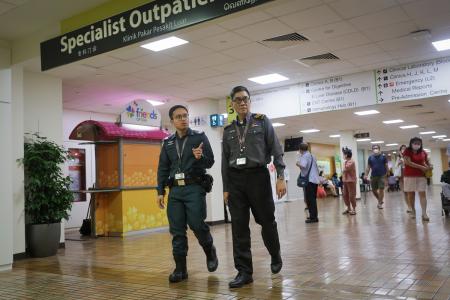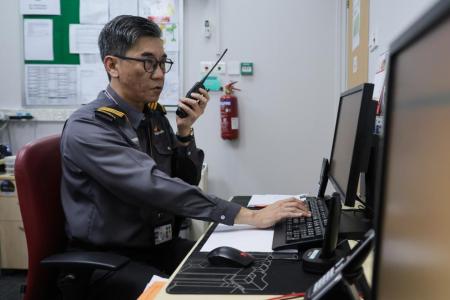Certis officers wind up at receiving end when dealing with abuse in healthcare institutions
In October, two Certis officers became victims of an alleged attack when they tried to stop a surly man from leaving the emergency department of the Singapore General Hospital (SGH).
“The man was becoming increasingly agitated and started hurling vulgarities at the officers and threatening them,” security supervisor Sammy Lee, 55, told The Straits Times. He was watching the drama unfold from his seat in the hospital command centre.
Mr Lee, who started working with the Certis Group 1½ years ago, sent back-up officers to help the officers and informed the police.
“By then, the thickly built man was already quite violent, attacking both officers. He punched one of them in the face, causing a cut to his lip, and his spectacles broke in two. The other officer was kicked between his legs,” he said.
“Some of the hospital staff, even the nurses, jumped into the fray to try to pin him down. That was when back-up and the police arrived. He was restrained.”
Mr Lee and his colleague, auxiliary police officer Muhammad Redhuan Azmi, 27, are part of the 350 Certis officers deployed to the nearly 40 healthcare institutions and facilities in Singapore to ensure the safety and security of patients, healthcare staff and visitors.
The officers stand alongside other front-line service personnel, supporting the healthcare staff in difficult situations, especially in environments where emotions run high.

“On average, our security officers are activated to respond to close to 1,000 incidents every month, averaging between 20 and 30 in a single day. It is, therefore, common for our officers to be on the receiving end of abuse. These incidents can range in severity from verbal to physical abuse,” said Certis Group senior vice-president Robin Goh.
Security officers in healthcare institutions monitor closed-circuit television surveillance and alarms, patrol the premises, control crowds and manage parking. They also help visitors, respond to incidents, escort patients, manage security threats and handle a range of emergencies.
However, not everyone is aware of the critical role Certis officers play at healthcare institutions and facilities.
“Security officers serve as important first responders, often faced with the task of de-escalating tensions. Their presence is also a source of deterrence, assuring employees, patients and visitors of a safe environment, and allowing healthcare staff to focus on their primary duties,” said Mr Goh, who also heads group communications and marketing.
While pounding the beat to make sure no one mistreats healthcare workers, Certis officers sometimes find themselves at the receiving end of verbal and physical abuses.
Mr Lee, who has been managing people for close to 30 years, first in the food and beverage sector and then in sales, said his senses are heightened whenever he is at work.
“This (security) sector is very challenging. I need to be sharper, more focused while on the job. It is because I need to be ready to face the many different situations,” he added.
While Mr Lee does not carry firearms at work, his colleague, Sergeant (APF) Redhuan, an auxiliary police officer, does. But he has never seen the need to draw his gun.
Certis said its officers deployed at medical institutions undergo appropriate and comprehensive training to ensure that they are prepared.
Beyond the mandatory security skills training, Mr Goh said, additional training includes first aid, Company Emergency Response Team (Cert) techniques – which help them prevent emergencies from escalating into a major incident – and non-lethal self-defence.
Get The New Paper on your phone with the free TNP app. Download from the Apple App Store or Google Play Store now


